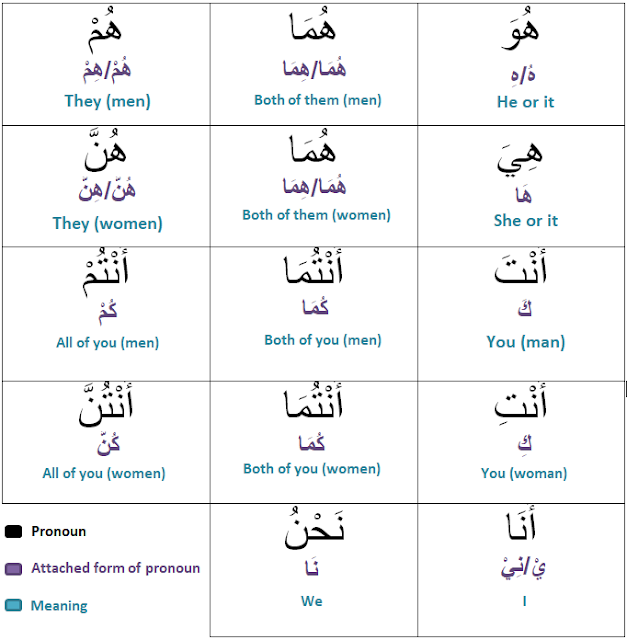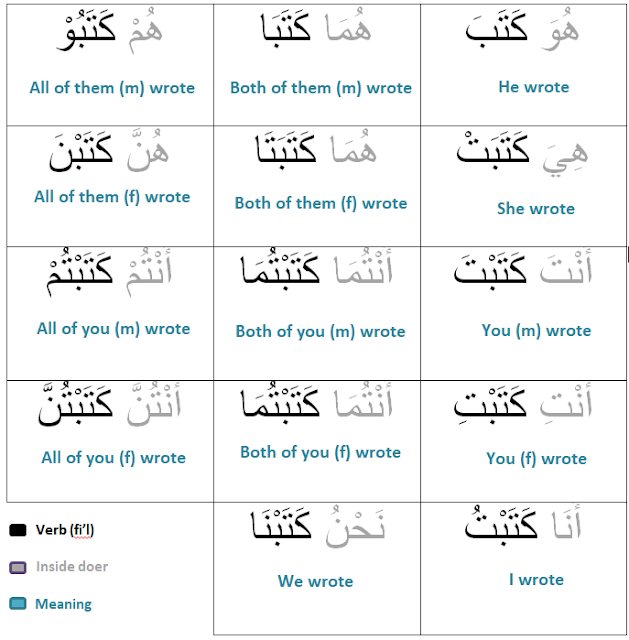Status detailed part 2: Flexibility (English + Dhivehi)
Status detailed part 2: Flexibility
There are 3
flexibilities of ism.
1. Fully flexible
(regular Arabic words)
2. Partly flexible
3. Non-flexible
Fully
flexible
If an ism is
fully flexible, it will be different in rafa’, nasb and jarr status. For
example:
مُسْلِمٌ (rafa’)
مُسْلِمًا (nasb)
مُسْلِمٍ (jarr)
Most isms
are fully flexible and have this pattern. All heavy words are fully flexible.
Partly
flexible
If an ism is
partly flexible, the ism will not have tanween which means they are light. And
they will not have a kasrah.
Some partly
flexible words can be names of places: eg:- Makkah, Yathrib or it can also be
non-Arab names: eg:- Dawud, Suleiman, Ibrahim
Let’s look
at how the ism ‘Ibrahim’ changes in different status.
أِبْرَاهِيمُ (rafa’)
أِبْرَاهِيمَ (nasb)
أِبْرَاهِيمَ (jarr)
As you can see after the nasb status, the word remains same. Thus known
as ‘partly flexible’.
Non-flexible
Isms that are non-flexible stay the same in all statuses. For example:
مُوْسَى
(rafa')
مُوْسَى
(nasb)
مُوْسَى (jarr)
Same goes with the name ‘Isa and the word هَذَا
Usually the words that end with a ى are non-flexible.
Note:
There are 4 names of Prophets in the Quran that are Arab. Since the
names of those Prophets are Arab names they are fully flexible as shown below.
Jarr
|
Nasb
|
Rafa’
|
هُوْدٍ
|
هُودًا
|
هُوْدٌ
|
صَالِحٍ
|
صَالِحًا
|
صَالِحٌ
|
شُعَيْبٍ
|
شُعَيْبًا
|
شُعَيْبٌ
|
مُحَمَّدٍ
|
مُحَمَّدًا
|
مُحَمَّدٌ
|
Exercise:
Identify whether the given words are flexible, partly flexible or
non-flexible.
الْكِتَابِ
مُخْلِصًا
مُعْرِضُونَ
فِرْعَوْنَ
(non-arab name)
عِمْرَانَ(non-arab
name)
عَمَدٍ
هُدًى
*****************************************************************
މަޤާމް ތަފްޞީލުކުރެވިފައި (ދެވަނަ ބައި): އިސްމްތައް ބަދަލުވާ މިންވަރު
އިސްމްއެއް 3 ގޮތަކަށް ބަދަލުވެއެވެ. އެއީ:
1.
ފުރިހަމައަށް ބަދަލުވުން
2.
ވަކިވަރަކަށް ބަދަލުވުން
3.
އެއްވެސް ވަރަކަށް ބަދަލުނުވުން
ފުރިހަމައަށް ބަދަލުވުން
އިސްމްއެއް ފުރިހަމައަށް ބަދަލުވާ
ނަމަ އޭތި އޮންނާނީ 3 މަޤާމުގައި ތަފާތު 3 ގޮތަކަށެވެ. މިސާލު:
مُسْلِمٌ (ރަފަޢް)
مُسْلِمًا (ނަޞްބަ)
مُسْلِمٍ (ޖަރް)
ޢާއްމުގޮތެއްގައި ފުރިހަމައަށް ބަދަލުވާ އިސްމްތައް 'ބަރު' ވާނެއެވެ. (ކުރީގެ
ފިލާވަޅު ބައްލަވާ)
ވަކިވަރަކަށް ބަދަލުވުން
ވަކިވަރަކަށް ބަދަލުވާ އިސްމްތަކުގައި ތަންވީނެއް ނޯންނާނެއެވެ.
އެހެންގޮތަކަށް ބުނާނަމަ މި އިސްމްތައް 'ލުއި' ވާނެއެވެ. އަދި މި އިސްމްތަކުގައި
އިބިފިއްޔެއްވެސް ނޯންނާނެއެވެ.
ވަކިވަރަކަށް ބަދަލުވާ އިސްމްތަކުގެ ތެރޭގައި ތަންތަނަށް ކިޔާ ނަންތައް
ހިމެނެއެވެ. މިސާލަކަށް: މައްކާ، ޔަޘްރިބް....އެހެންނޫނީ ޢަރަބި ނޫން ނަންތައް
ވެސް ހިމެނެއެވެ. މިސާލަކަށް: އިބްރާހީމް، ދާވޫދު، ސުލެއިމާން.
'އިބްރާހީމް' މި ނަން އެކި މަޤާމުތަކުގައި ހުންނަ ގޮތަށް ބަލާލަމާ ހިނގާށެވެ.
أِبْرَاهِيمُ (ރަފަޢް)
أِبْرَاهِيمَ (ނަޞްބް)
أِبْرَاهِيمَ (ޖަރް)
ފާހަގަވާނެ ފަދައިން ނަޞްބް މަޤާމްއިން ފެށިގެން ދެން މި އިސްމް އޮންނަނީ
އޮތްގޮތަށެވެ. އެހެންކަމުން މި ބަސް އަހަރުމެންނަށް އެނގެނީ 'ވަކިވަރަކަށް
ބަދަލުވާ' އިސްމްއެއްގެ ގޮތުގައެވެ.
އެއްވެސް ވަރަކަށް ބަދަލުނުވުން
އެއްވެސް ވަރަކަށް ބަދަލުނުވާ
އިސްމްތައް ހުރިހާ މަޤާމެއްގައި ވެސް ހުންނާނީ އެއްގޮތަކަށެވެ. މިސާލު:
مُوْسَى (ރަފަޢް)
مُوْسَى (ނަޞްބް)
مُوْسَى (ޖަރް)
'ޢީސާ' މި ނަންފުޅާއި هَذَا މި ބަހަށް ވެސް ވާނީ މިފަދައިންނެވެ.
ޢާއްމުގޮތެއްގައި ى އިން ނިމޭ ބަސްތައް ހިމެނޭނީ އެއްވެސް ވަރަކަށް
ބަދަލުނުވާ އިސްމްތަކުގެ ތެރޭގައެވެ.
ނޯޓް:
ޤުރުއާނުގައި ޢަރަބި 4 ރަސޫލުންގެ
ވާހަކަ އައިސްފައިވެއެވެ. މި ރަސޫލުންގެ ނަންފުޅުތަކަކީ ޢަރަބި ނަންފުޅުތަކަށް
ވުމުން އެ ނަންފުޅުތައް ހިމެނޭނީ ފުރިހަމައަށް ބަދަލުވާ އިސްމްތަކުގެ ތެރޭގައެވެ.
|
ޖަރް
|
ނަޞްބް
|
ރަފަޢް
|
|
هُوْدٍ
|
هُودًا
|
هُوْدٌ
|
|
صَالِحٍ
|
صَالِحًا
|
صَالِحٌ
|
|
شُعَيْبٍ
|
شُعَيْبًا
|
شُعَيْبٌ
|
|
مُحَمَّدٍ
|
مُحَمَّدًا
|
مُحَمَّدٌ
|
ފަރިތަކުރުން:
ތިރީގައިވާ ބަސްތަކަކީ ފުރިހަމައަށް ބަދަލުވާ
ނުވަތަ ވަކިވަރަކަށް ބަދަލުވާ ނުވަތަ އެއްވެސް ވަރަކަށް ބަދަލުނުވާ ބަސްތަކެއްތޯ
ބުނެދޭށެވެ.
الْكِتَابِ
مُخْلِصًا
مُعْرِضُونَ
فِرْعَوْنَ (ޢަރަބިނޫން ނަމެއް)
عِمْرَانَ (ޢަރަބި ނޫން ނަމެއް)
عَمَدٍ
هُدًى


Comments
Post a Comment